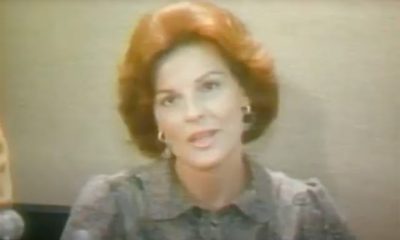Local
How bi-curious Hugh Hefner and the gays emboldened free speech and the sexual revolution
Hefner’s death reveals ties to gay community
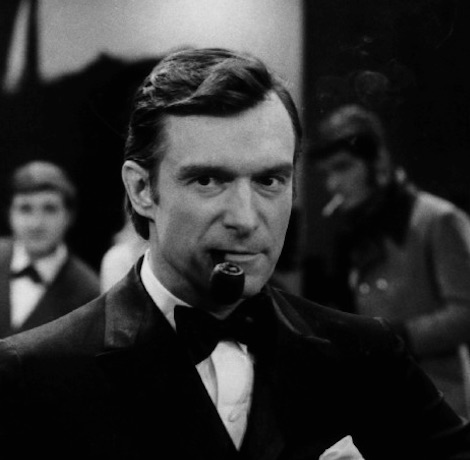
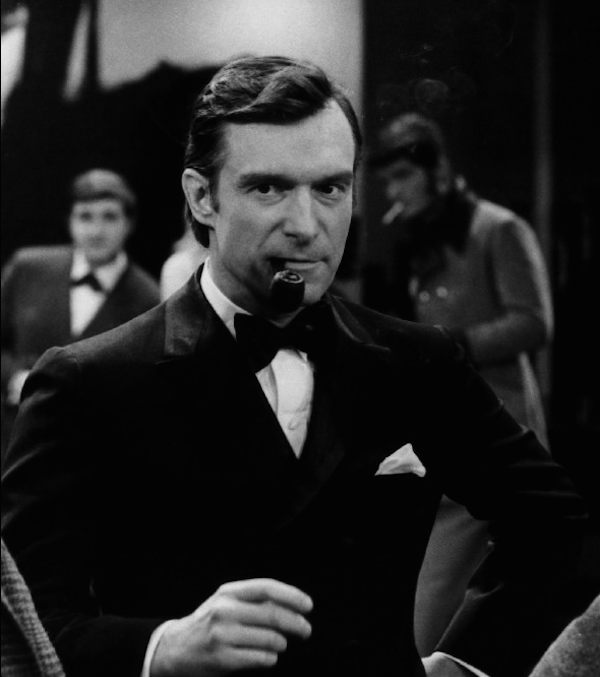
Hugh Hefner (Photo wikiCommons)
The right of individuals to exercise free speech without fear of government censorship, coercion or crack down has been much in the news recently as President Trump tries to bully NFL owners into firing football players who “take a knee” during the national anthem to protest police shootings of unarmed black men.
The First Amendment is perhaps the most cherished—and most assailed—of constitutional rights, with the interpretation changing with time and administrations. That became abundantly clear on Wednesday as Americans learned that Playboy Magazine founder Hugh Hefner died at age 91.
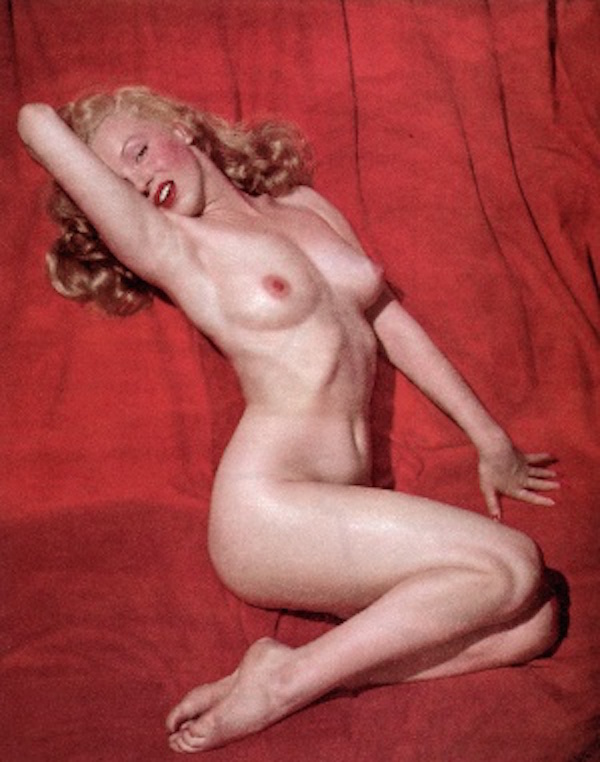
Marilyn Monroe was a Playboy covergirl several times.
Hefner is widely believed to be one of the instigators of the sexual revolution of the 1950/60s, launching Playboy Magazine in December 1953 featuring a nude centerfold of actress Marilyn Monroe at a time when chaste ultra-conservative conformity and McCarthyism were in full swing. From the beginning, Hefner championed the First Amendment, not only by celebrating female nudity but by serializing such controversial works as Ray Bradbury’s Fahrenheit 451 and in 1955, The year was 1955, science fiction author Charles Beaumont’s futuristic short story “The Crooked Man” in which homosexuality is the norm and heterosexuality is criminalized.
But perhaps Hefner’s greatest contribution to the sexual revolution and the parallel quiet movement for LGBT equality was the Playboy Forum where wide ranging discussions on taboo topics, including homosexuality, were enthusiastically encouraged.
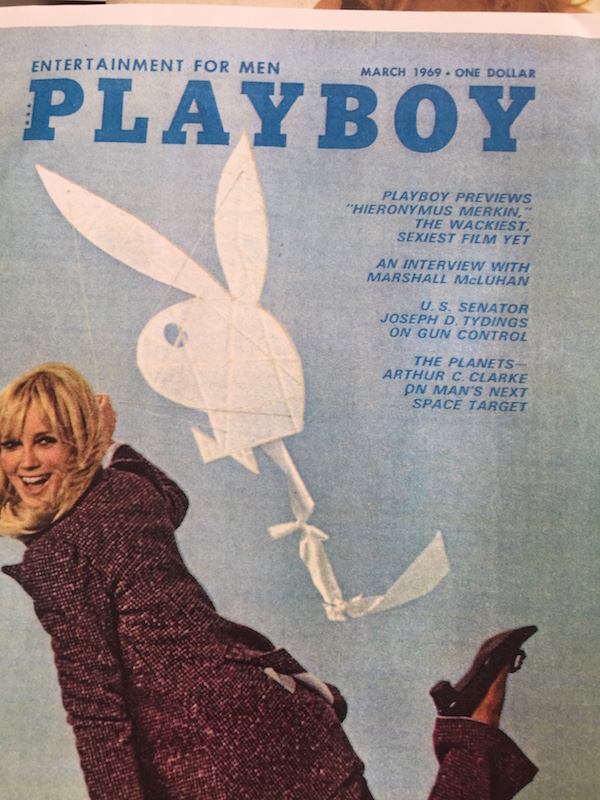
“What makes Hugh Hefner really important is the combination of his belief in the First Amendment and his Playboy philosophy,” which rebelled against religiously-mandated codes of sexual morality, Charles Francis, president of the Mattachine Society of Washington DC, tells the Los Angeles Blade.
“He was an early supporter of LGBT equality,” says Francis. “Playboy gave a platform where the first serious considerations about homosexuality could take place, well before Stonewall. (Mattachine Society/DC founder) Frank Kameny had serious back-and-forth discussions with psychiatrists and psychologists who thought homosexuality was an illness and a perversion. The Playboy philosophy was basically liberally enlightened about sex and humanistic and empathetic— homosexuals should be treated as human beings, not as perverts or deviants. It wasn’t porn or smut; it was progressive and encouraged open-minded inquiry.”
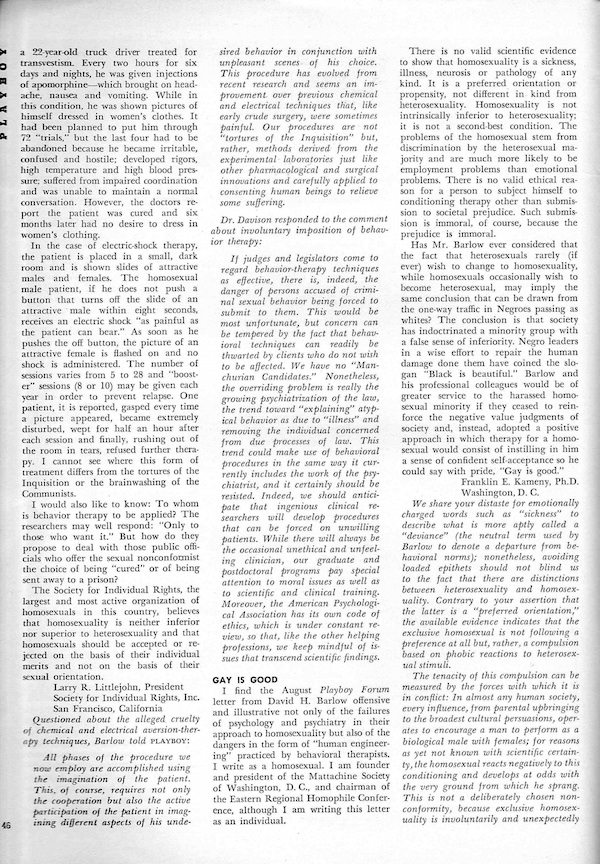
In fact, Francis says, Frank Kameny introduced his famous slogan “Gay is Good” in the “Playboy Forum” in the March 1969 issue. The forum enabled him to express his outrage at “normal” anti-gay attitudes and policies.
“The Playboy Forum gave Kameny the space to engage in substantive debate, over years, with such psychiatrists David H. Barlow and Gerald Davison about aversion therapy and whether or not homosexuality was a mental illness,” Francis says. “Dr. David Barlow is a past President of the Division of Clinical Psychology of the American Psychological Association, and still very much alive.
In the day, Barlow was promoting various therapies at the University of Mississippi, including something called ‘fading,’ in which a patient seeking to be ‘cured’ of homosexuality would be exposed to a series of images, ‘fading’ from a naked young man into a highly sexualized black woman.”
Though the Playboy Forum pushed back on Frank “that homosexuality is a ‘compulsion based on phobic responses to heterosexual stimuli,’” Francis says, “the Forum itself was the only mainstream, popular platform to give him that much space and the ability to write at length about his ideas and reactions to psychiatrists like Davison and Barlow.”
Historian Mark Stein wrote in his 2010 legal accounting of the sexual revolution, Sexual Injustice, that Playboy created “what may have been the country’s most influential forum for public discussion about homosexuality during this period.”
Francis discovered in the Kameny Papers at the Library of Congress that “Playboy Forum Associate Editor Henry Fenwick actually shared with Frank many of the letters (names withheld) Playboy had received on these exchanges–from groups like Texas Advocates for Human Dignity,” Francis says. “Fenwick wrote Kameny on May 7, 1969, just months before the Stonewall riots: “In spite of our differences of opinion I hope we can continue to keep our lines of communication open. I believe the dialogue to be very useful, and we appreciate your continued cooperation.”
It turns out Hefner may have read Kameny’s “Gay is Good” missives, too. In a 1999 interview, Carrie Leigh, who lived with Hefner for five years in the 1980s and filed three lawsuits against him, told the Washington Post that Hefner’s infamous and misogynistic sexual swinging also included men.
The Post reported: “Leigh and other Hefner girlfriends from the 1980s say they were also disturbed by Hefner’s propensity for sexual encounters with men. Leigh says she interrupted Hefner’s liaisons with men a couple of times. The irony that this symbol of heterosexual male virility was involved homosexually was not lost on her. But her real fear was that it indicated Hefner’s only true interest in women was exploitive. ‘It bothered me. It totally flipped me out,’ she says. ‘I tried to accept it. He thought it was all okay.’”
Indeed, in the interview with the Post, Hefner acknowledged having bisexual trysts.
“There was some bisexuality in the heterosexual, swinging part of my life,” Hefner told the Post, adding that Leigh, who also had lesbian dalliances was “obsessed” with gays and her suspicion that he preferred men was only a “projection” on her part.
“I was testing the boundaries, just knocking down walls,” Hefner said. “That period of sexual experimentation is long gone.”
Aside from dabbling in bisexuality and promoting open discussions, Hefner also stood up for civil rights, gay rights, and opened his Playboy Mansion for AIDS fundraisers. When straight readers sent in angry letters about Beaumont’s sci fi depiction of straight people having to sneak into dark barrooms to find someone to love, Hefner was quick to reply. “If it was wrong to persecute heterosexuals in a homosexual society,” he wrote, “then the reverse was wrong, too.”
But the greatest boon to Hefner and his Playboy Enterprises—and hence the goose that jump-started the sexual revolution and the sexual liberation movement was a gay lawsuit that reached the US Supreme Court—ONE Inc. v. Olesen, the landmark lawsuit that the gay publication, ONE Magazine, was not obscene and could therefore be sent through the US Post Office.
“ONE filled a very critical role for gays and lesbians during a very dark time,” BoxTurtleBulletin founder Jim Burroway wrote on January 13th, 2008, the 50th anniversary of the first gay victory at the Supreme Court on January 13, 1958.
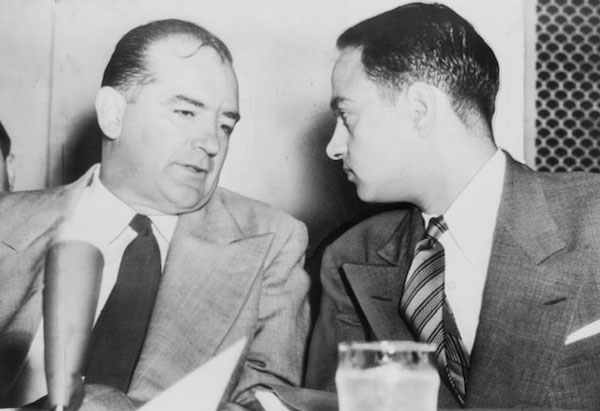
Sen. Joe McCarthy and chief deputy Roy Cohen
ONE’s 1953 debut coincided with a major anti-gay push by the federal government, with President Dwight D. Eisenhower siding with communist and gay-hunter, Sen. Joe McCarthy, who framed gays as a subversive national security risk and a threat to the country’s moral fiber. Eisenhower’s Executive Order 10450 included a “sexual perversion” clause that prohibited gays and lesbians from federal employment; homosexuality was a crime in every state and considered a mental illness.
J. Edgar Hoover launched a major FBI crackdown on every aspect of homosexuality, from entrapment stings to confiscating and trying to shut down publications such as ONE Magazine, which was sold in gay bars and by subscription. The FBI, Burroway writes, “went so far as to write to the employers of ONE’s editors and writers (they all depended on their day jobs for income), saying that their employees were ‘deviants’ and ‘security risks.’ Fortunately, no one lost their jobs, the FBI decided it wasn’t worth their time, and ONE continued publishing.”
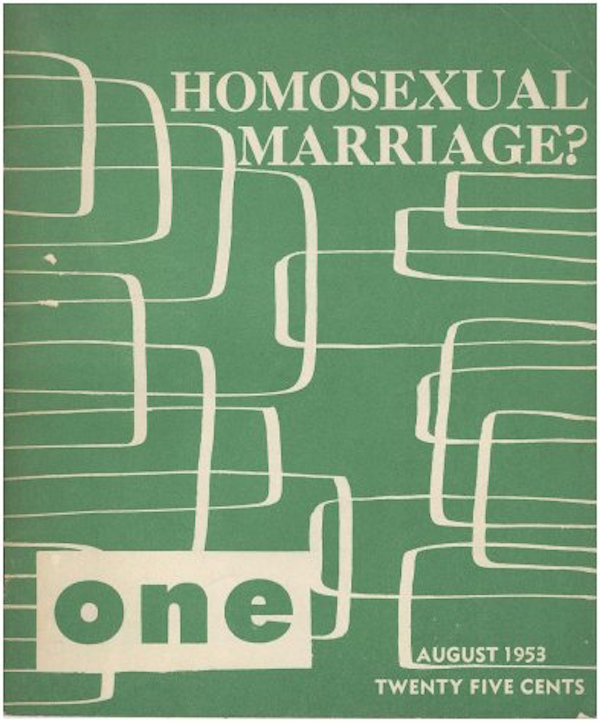
The U.S. Post Office then took up the mantle, with the Los Angeles branch checking each issue before shipping. In August 1953, postal authorities held up the issue on “Homosexual Marriage” for three weeks to check if it violated federal laws. It didn’t and it was released. ONE sniped back in the October issue, saying on the cover “ONE is not grateful”:
“It is true that this decision is historic. Never before has a governmental agency of this size admitted that homosexuals not only have legal rights but might have respectable motives as well. The admission is welcome, but it’s tardy and far from enough. As we sit around quietly like nice little ladies and gentlemen gradually educating the public and the courts at our leisure, thousands of homosexuals are being unjustly arrested, blackmailed, fined, jailed, intimidated, beaten, ruined and murdered.”
The victory was short-lived. Having seen a copy of the March 1954 issue—“The Importance of Being Different”— Senate Foreign Relations Committee Chairman Alexander Wiley (R-WI), wrote a protest letter to U.S. Postmaster General Arthur Summerfield, registering a “vigorous protest against the use of the United States mails to transmit a so-called ‘magazine’ devoted to the advancement of sexual perversions.” Allowing a homosexual magazine to operate, he wrote, “(a) runs utterly contrary to every moral principle, (b) runs utterly contrary to our intentions to safeguard our nation’s youngsters, (c) likewise, it is the very opposite of the entire purpose of our governmental security program…”
ONE tried not to get shut down through government censorship, having their young straight lawyer, Eric Julber, to write rules to avoid conflict. But the October 1954 issue featured a fictional short story entitled “Sappho Remembered,” in which two young lovers touched four times and declared their love—and, most deplorable—the story had a happy, not dire or suicidal ending. The issue also featured a snarky poem about the gay arrests of British notable and two ads postal authorities construed as promoting obscenity.
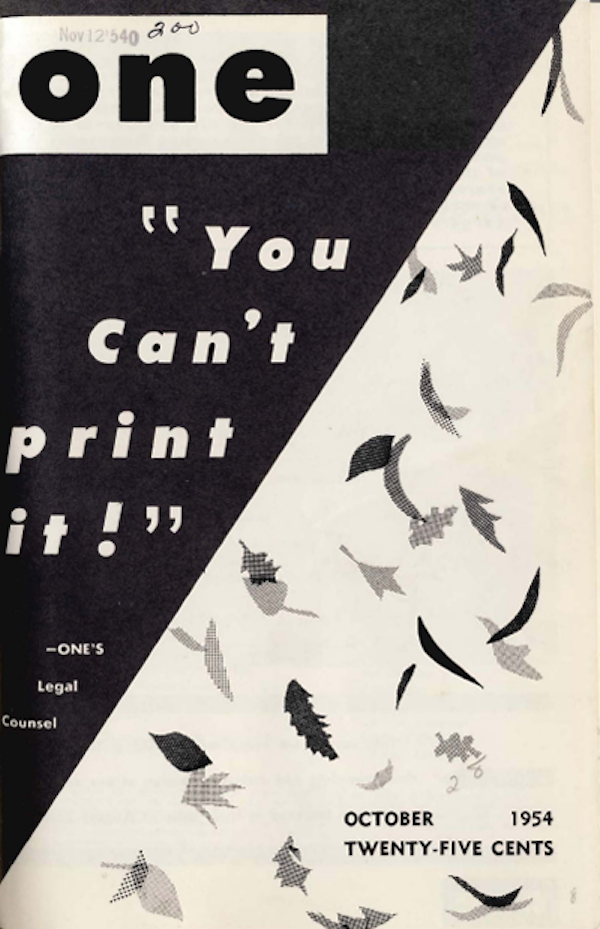
LA postal officials seized the “You Can’t Print It!” issue and, Burroway reports, “charged the editors with violating the 1873 Comstock Act, which prohibited sending ‘obscene, lewd, and/or lascivious’ material through the mail.”
Broke, ONE’s editors waited a year to sue, with Julber,30, taking the case pro bono. The ACLU, which was still defending anti-sodomy laws at the time, refused to help. Julber flew solo and it didn’t go well as he argued that ONE Magazine was not pornographic but educational. In March 1956, the judge ruled for the Post Office, as did the 9th Circuit Court of Appeals in February 1957, writing that the magazine “has a primary purpose of exciting lust, lewd and lascivious thoughts and sensual desires in the minds of persons reading it.”
Julber filed his petition with the Supreme Court on June 13, 1957. He argued that lower courts had allowed publications advocating nudism, so why did the 9th Circuit “singled out and discriminated against” ONE because it dealt with homosexuality?
In fact, Hefner’s HMH Publishing Company sued the US Post Office in 1955 because Postmaster General Arthur Summerfield deemed Playboy obscene and prohibited its distribution through the mail. Hefner won and received $100,000 in damages, as well as Playboy being granted a “B” class permit to operate without the risk of government censorship.
In a quirk of fate, the Supreme Court had been dealing with the issue of obscenity in Roth v. the United States. New York book dealer Samuel Roth was appealing his conviction for selling and mailing sexually explicit books, circulars and advertising. The Justices upheld his conviction in a 6-3 decision, but narrowed the definition of obscenity, which is not constitutionally protected free speech under the First Amendment.
“All ideas having even the slightest redeeming social importance — unorthodox ideas, controversial ideas, even ideas hateful to the prevailing climate of opinion — have the full protection of the guaranties, unless excludable because they encroach upon the limited area of more important interests; but implicit in the history of the First Amendment is the rejection of obscenity as utterly without redeeming social importance,” wrote Justice William J. Brennan, adding that “Sex and obscenity are not synonymous.”
The Court handed down its ruling on June 24, 1957, 11 days after Julber filed his petition. The Court took ONE’s case and rendered a one-sentence ruling in ONE Incorporated vs Olesen on January 13, 1958, reversing the 9th Circuit decision, expanding the First Amendment and limiting the Comstock Act. No longer branded “obscene,” ONE Magazine—and similar magazines—could be sent through the mail without legal action taken by the Post Office.
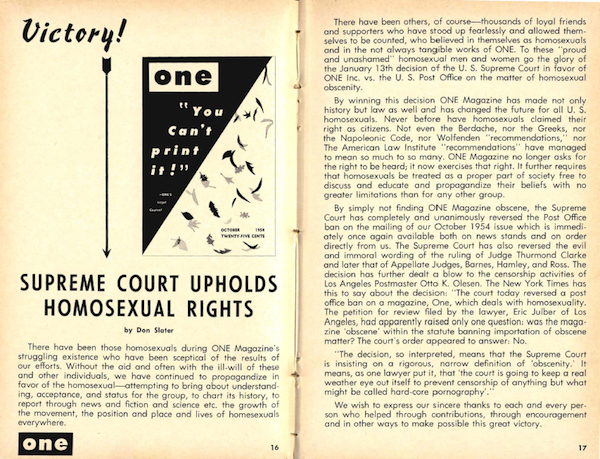
ONE editors noted this coverage from The New York Times: “The court today reversed a post office ban on a magazine, One, which deals with homosexuality. The petition for review filed by the lawyer, Eric Julber of Los Angeles, had apparently raised only one question: was the magazine ‘obscene’ within the statute banning importation of obscene matter? The court’s order appeared to answer: No.”
Hefner existed in a parallel universe, with Playboy Magazine, like ONE Magazine, also considered “smut” by the moral arbiters at the Post Office. And despite Hefner’s earlier win—and despite ONE Magazine’s win in January, by November 1958, the Post Office was after Hefner again, this time trying to ban the “lewd” Playboy from the mail system entirely. Hefner got a restraining order, which enabled him to keep distributing Playboy, while he continued to challenge the Post Office through the courts. Hefner won his lawsuit at the Supreme court, HMH Publishing vs the US Post Office in 1959.
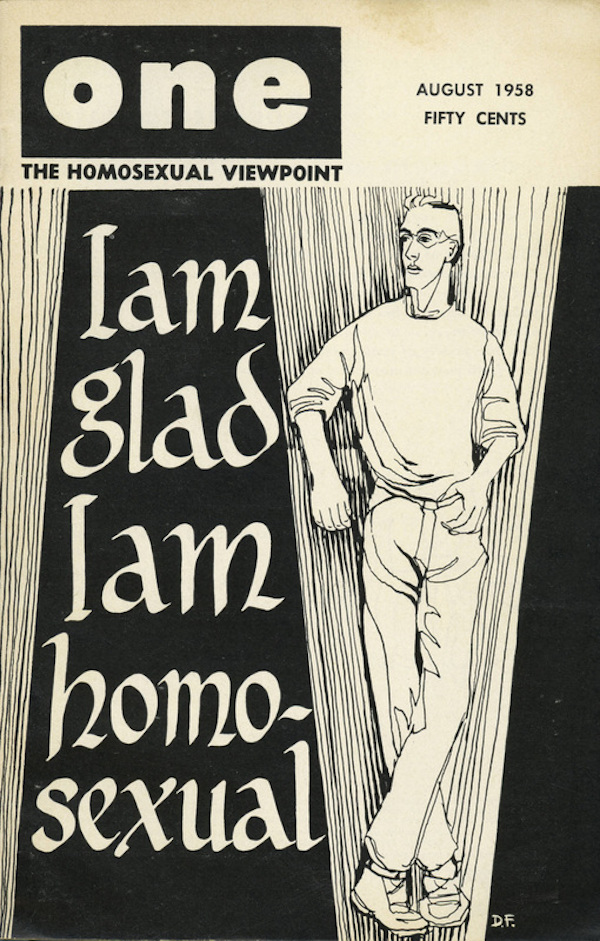
ONE Magazine writer and editor Jim Kepner said Hefner was always grateful for the legal victory achieved by ONE Magazine at the Supreme Court, which paved the way for his victory—and for the sexual revolution. And gays were grateful, too, for the Playboy Forum that allowed them to see themselves as human beings, not society’s deviants.
Indeed, one can almost say that gays bought Playboy for the articles.
Los Angeles
UCLA’s long-standing LGBTQ+ alumni organization welcomes new president
The Blade sat down with paralegal studies professor and local advocate Bobby Rimas to talk about intersectional leadership and his goals for the UCLA Lambda Alumni Association.

As a young student studying history at UCLA, Bobby Rimas was grounded by his growing desire to give back to his community. He worked as a tutor for low-income students and became invested in learning about the ways intersectionality impacts people’s access to education and resources. “My barriers may not be the same as yours, and your barriers may not be the same as mine,” Rimas told the Blade. “How do you apply that in leadership [and] in the classroom?”
After 15 years of service to UCLA’s various alumni networks, first beginning with the Pilipino Alumni Association, Rimas became president of the university’s Lambda Alumni Association on Jan. 1. The UCLA Lambda Alumni Association was formed in 1989 as a way to support LGBTQ+ students and graduates with professional development, scholarship opportunities, mentorship, and other outreach support.
UCLA has long been a local epicenter of queer activism and advancement. Students formed groups like the Gay Student Union and Lesbian Sisterhood in 1969 and 1973, respectively, to empower and connect queer students. Queer art and culture also thrived in this time, as students saw the launches of the queer campus paper, magazine, and a film festival that centered on LGBTQ+ stories.
Administratively, campus officials were taking a stance against LGBTQ+ discrimination. In 1975, UCLA Chancellor Charles E. Young banned departments and programs from discriminating on the basis of sexual orientation.
In the decades since, leaders like Rimas are working to preserve this history and also build upon it. How can we inspire students in and out of the classroom? How do we make sure they have access to valuable resources and can advocate for themselves in places that are not always inclusive of their needs and identities?
Rimas often ponders these questions, both as president of the Lambda Alumni Association and at Cal State LA, where he works as an associate professor of paralegal studies. There is often cross-pollination in the concerns he receives from alumni members as well as his students: How do they find employers who are accepting of LGBTQ+ people? How do they avoid being discriminated against in the workplace?
These are questions Rimas hopes to tackle more in his role as president of the UCLA Lambda Alumni Association and in his continued tenure as an educator. One of his first goals is to expand the board and bring on more diverse perspectives to the organization. “More people means more activity,” Rimas said, who hopes that the combined knowledge and resources of the board can better serve students and alumni.
Rimas also hopes to throw a large Gala event, one that mirrors the extravagant, celebratory 2019 bash he organized for the association when he was first brought onto the team. 100 people attended, creating a wave of awareness for the organization and increasing their scholarship funding.
What’s next? UCLA Lambda Alumni Association’s first board meeting is this upcoming Monday. Rimas hopes to discuss strategies to grow the organization’s presence beyond the campus’ reach, in other queer cornerstones like West Hollywood, elevating diverse LGBTQ+ voices, and improving ways they can professionally support their network’s members.
Kristie Song is a California Local News Fellow placed with the Los Angeles Blade. The California Local News Fellowship is a state-funded initiative to support and strengthen local news reporting. Learn more about it at fellowships.journalism.berkeley.edu/cafellows.
Los Angeles
South L.A. celebrated Black joy and resistance at yesterday’s Martin Luther King Jr. Day Parade
The Blade also sat with staff from Center South, a community site that champions the safety and health of South L.A.’s LGBTQ+ communities of color.
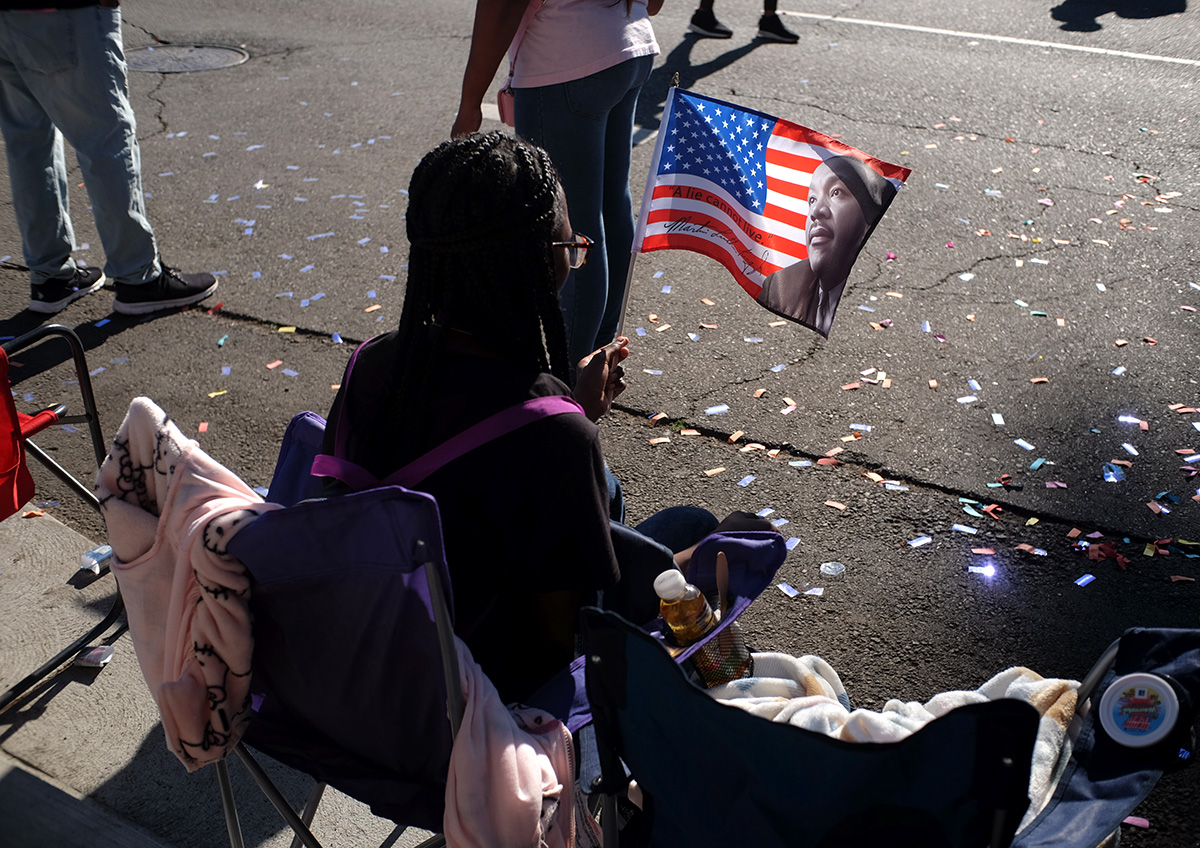
At 9 a.m. on Monday, Jan. 19, South L.A. community members gathered on the streets, holding onto lawn chairs and the hands of their children and family members. “Good morning,” one greeted. “Are you ready for the parade?” Neighbors laughed and hugged underneath the warm morning sun, staring into the horizon in anticipation of the county’s official Martin Luther King Jr. Day Parade, organized by Bakewell Media and the Los Angeles Sentinel Newspaper.
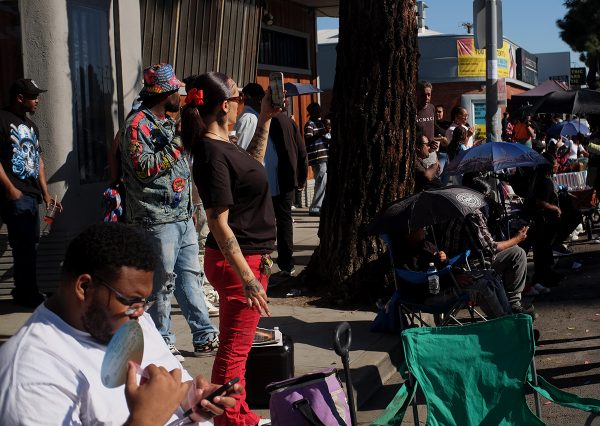
When the parade began an hour later, organizations like labor union SEIU Local 721, civil rights group Black Lives Matter Los Angeles, and HIV care and advocacy nonprofit AIDS Healthcare Foundation marched to cheers and waves from the crowd. Young musicians, drill and cheer teams from Marcus Garvey School and other schools stepped in unison, performing elaborate routines and sending jolting, infectious waves of drum and trumpet like electricity through paradegoers.
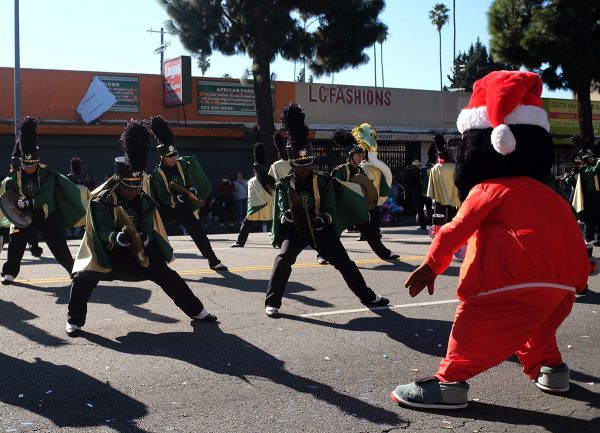
Black liberty and joy coalesced with a call to face injustice at yesterday’s festivities. Black Lives Matter Los Angeles members handed out flyers demanding accountability for Keith Porter, who was killed by an off-duty Immigration and Customs Enforcement (ICE) agent on Dec. 31. Marchers also waved the Iranian flag in solidarity with its people, who have faced increasing state-sanctioned violence after they began protesting the government in the midst of an economic downfall.
Communal care and empowerment remain, for many, the only way forward as trust in broader governmental systems and structures wanes. While celebrating the monumental work of the late civil rights activist, community members yesterday echoed an important, resonant message: The work is not yet done.
This community work is largely supported by local advocates and organizations like Center South: one of the Los Angeles LGBT Center’s community sites. Yesterday morning, ahead of the parade, senior program manager Steven Campa and fellow staff members welcomed people into the space for coffee and pastries.
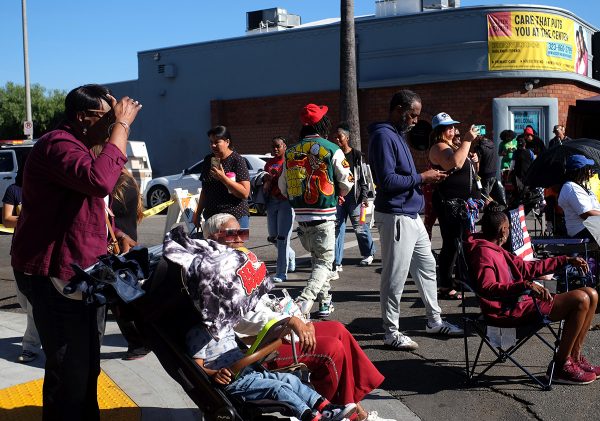
They also handed out flyers introducing residents to the site’s resources, which include: hygiene kits, HIV testing, a free monthly farmers market and clothing closet, mental health and primary care services, substance use and recovery programs, as well as social groups that prioritize LGBTQ+ people of color living in the neighborhood.
Center South opened six years ago, reclaiming a space that once housed a vibrant jazz supper club. At first, the site focused on providing services specifically for men who have sex with men (MSM), regardless of whether or not they identified as a member of the LGBTQ+ community. Over time, Center South became more inclusive of and responsive to the local community as a whole, becoming a safe space for anyone in South L.A. seeking refuge and care.
Campa, who has been with Center South since its founding, emphasized the constantly-evolving nature of the place as it molds itself to best serve and represent its community. Staff members and clinicians are nurtured by their own personal connections to the neighborhood, yearning to give back to the place that raised them.
And that has an effect. “How does it look to have a provider who’s queer: a provider that looks like folks in the community?” Campa said. “We’re our community. Folks grew up [here]…To speak to the MLK Day parade, this was a holiday for the Center. Folks chose to be here. Understanding that we are on MLK Boulevard, we want to continue to do [show up] every year to provide a safe space for the community.”
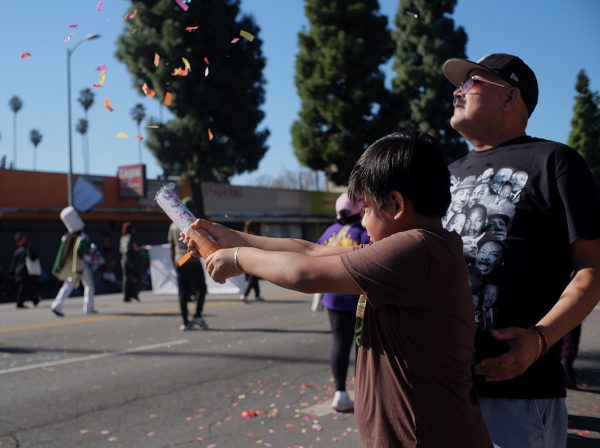
Campa, his staff members, and fellow Los Angeles LGBT Center staff want to expand what it means to be safe and healthy — and to see that reflected more broadly in their communities. “A healthy person needs medical care [and more],” said the Center’s chief equity officer, Giovanna Fischer, who showed up on Monday to celebrate the parade with the community. “[They also] need food access, immigration support…That’s definitely going to impact their health and wellbeing,” Fischer told the Blade. “
Campa, Fischer, and other advocates are strategizing for their community in uncertain times, as threats to instrumental funding are seemingly always on the table. But as they “forecast for the future” and continue to build a collective vision that uplifts LGBTQ+ people of color, their fight endures. “We deserve to think about where we want to go,” Fischer said. “We deserve the opportunity to dream and scheme, and so does our community. So until further notice, we’re going to continue to do that.”
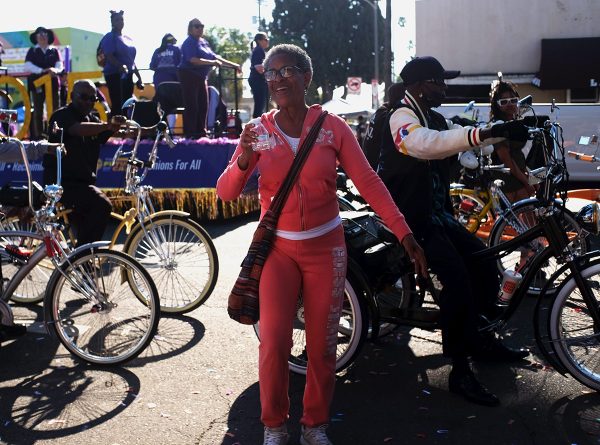
Kristie Song is a California Local News Fellow placed with the Los Angeles Blade. The California Local News Fellowship is a state-funded initiative to support and strengthen local news reporting. Learn more about it at fellowships.journalism.berkeley.edu/cafellows.
Los Angeles
Advocates demand that trans youth be protected as cases are argued in Supreme Court
This week, LGBTQ+ advocates and legal experts spoke in support of trans youth as two Supreme Court cases challenge their rights and safety.

This Tuesday, the Supreme Court heard oral arguments regarding two cases about transgender girls in sports: Little v. Hecox and West Virginia v. B.P.J.
In 2020, Idaho Governor Brad Little signed into law HB 500, which bans transgender girls and women from participating in school sports. This affected the first case’s respondent: transgender student athlete Lindsay Hecox, who was barred from participating in the track and cross country teams as well as intramural soccer and running clubs.
In 2021, then-governor of West Virginia, Jim Justice, approved HB 3293, which enacts a similar ban. Becky Pepper-Jackson (B.P.J.), now an incoming high school student, opposed the discriminatory policy when it prevented her from joining her then-middle school’s cross country and track and field teams. Pepper-Jackson has also only undergone female puberty due to gender-affirming care, but West Virginia argues that its anti-transgender policies should be upheld because of her assigned sex at birth.
For LGBTQ+ advocates and allies, these cases illustrate the burden and harm transgender people face daily as their rights to privacy, dignity, care, and inclusion are constantly at risk of being eroded and stripped completely.
Experts also wonder if these cases could potentially reshape the Constitution’s Equal Protection Clause as well as the civil rights law, Title IX. The former prohibits discrimination on other factors aside from race, though governments have argued that certain “suspect classifications” can be looked at more closely through “heightened scrutiny.” The latter prohibits sex-based discrimination in federally-funded schools.
What is unfolding and how local advocates are informing change:
The fight ahead is weary, and experts are certain that the states involved will not concede their points. In a webinar organized yesterday by the Williams Institute, several LGBTQ+ policy experts, including Rutgers Law School professor and anti-discrimination scholar Katie Eyer, examined where these cases may be heading, as well as efforts to muddy the arguments.
“It seems possible that the court might try to sidestep that issue here by saying that these laws don’t target transgender people at all,” Eyer said. “I think for most people, this seems bananas: like an upside-down world. We all know these laws were about transgender people.”
Jenny Pizer, an attorney for the LGBTQ+ civil rights legal organization Lambda Legal and a co-counsel member for the B.P.J. case, affirmed this sentiment at a press conference organized Tuesday by Lambda Legal and AIDS Healthcare Foundation affinity group, FLUX. “They’ve gone to great lengths to say there’s no discrimination,” Pizer said. “[They’re arguing] it’s just technicalities or classifications.”
Eyer was one of three Equal Protections scholars who filed an amicus brief to be considered in the Supreme Court cases. An amicus brief is a legal document submitted by someone who is not involved directly in a case but who may offer additional perspectives and information that can inform the ruling process.
Eyer’s brief provided historical context that clarified the disadvantages of blanket sex-based policies. These types of laws, according to Eyer, uphold stereotypes over nuance, truth, and equal protection guidelines. For Pepper-Jackson, who has only undergone female puberty and who does not “benefit” from what dissidents define as a sex-based competitive “advantage,” the state should have provided her the ability to argue that she should have the same rights as other girls.
“Of course, the state hasn’t done that here,” Eyer said. “Under these precedents, the Supreme Court should invalidate the laws as applied to those trans girls who really don’t have a sex-based competitive advantage.”
Who are these bills protecting?
The states argue that their policies are merely “ensuring safety and fairness in girls’ sports.” But queer advocates understand that this is a veneer for the exclusion of transgender people from society. Forcing trans youth out of sports “does not protect anyone,” according to California LGBTQ Health and Human Services Network director Dannie Ceseňa, who spoke at Tuesday’s press conference.
“It encourages the scrutiny of children’s bodies. It fuels gender policing, and it creates hostile school environments — not safer ones,” said Ceseňa. “Our youth should not inherit a world that treats their existence as a threat.”
Transgender people are systemically disempowered
At yesterday’s webinar, Distinguished Visiting Scholar at the Williams Institute Andrew Flores discussed his own amicus brief in support of Pepper-Jackson. The brief highlights the need for “heightened judicial scrutiny” in Pepper-Jackson’s case because the majority of political processes “systemically fail” transgender people.
For example, the transgender community faces substantial barriers in exercising their voter rights because of voter identification laws and other policies that regulate and define identity. “Even being able to gain access to the franchise is a burden for transgender people,” Flores said. “The court does play an important role there. It can grant legitimacy to arguments…or at least [acknowledge] that these issues are more complicated than maybe how they’ll receive them.”
What’s next?
Experts are hesitant about where the cases stand. “Bottom line: I don’t know what the court is going to do in these cases. They may send them back down for further development,” Pizer said, who thinks future rulings will not shift more overarching policies regarding transgender rights. “I think they will probably decide based only on laws about sports, not laws more broadly about the rights of trans folks.”
But whatever is decided, the impacts will trickle down to everyone. While the cases deal specifically with anti-transgender policies, experts warn that LGBTQ+ issues have always been tied to racial, economic, and disability justice. “There’s this looming constitutional campaign to really undermine civil rights,” said Eyer. “That affects LGBTQ people. It affects people of color. It affects people with disabilities. It affects everybody, and it really is concerning.”
As transgender inclusion and safety are being argued on the largest legal stage, advocates are asking: “When are you going to step up?” They are also sending a direct message to transgender youth: “We see you, we believe in you, and we are fighting for you,” said Ceseňa. “You deserve joy, community, and care. You deserve a future that reflects who you are and not who anyone or any politician demands you to be. Trans youth deserve better.”
Kristie Song is a California Local News Fellow placed with the Los Angeles Blade. The California Local News Fellowship is a state-funded initiative to support and strengthen local news reporting. Learn more about it at fellowships.journalism.berkeley.edu/cafellows.
West Hollywood
John Heilman and Danny Hang will serve as WeHo’s new Mayor and Vice Mayor
Last night, community members and local officials gathered to celebrate new leadership and bid a warm farewell to outgoing Mayor Chelsea Byers.
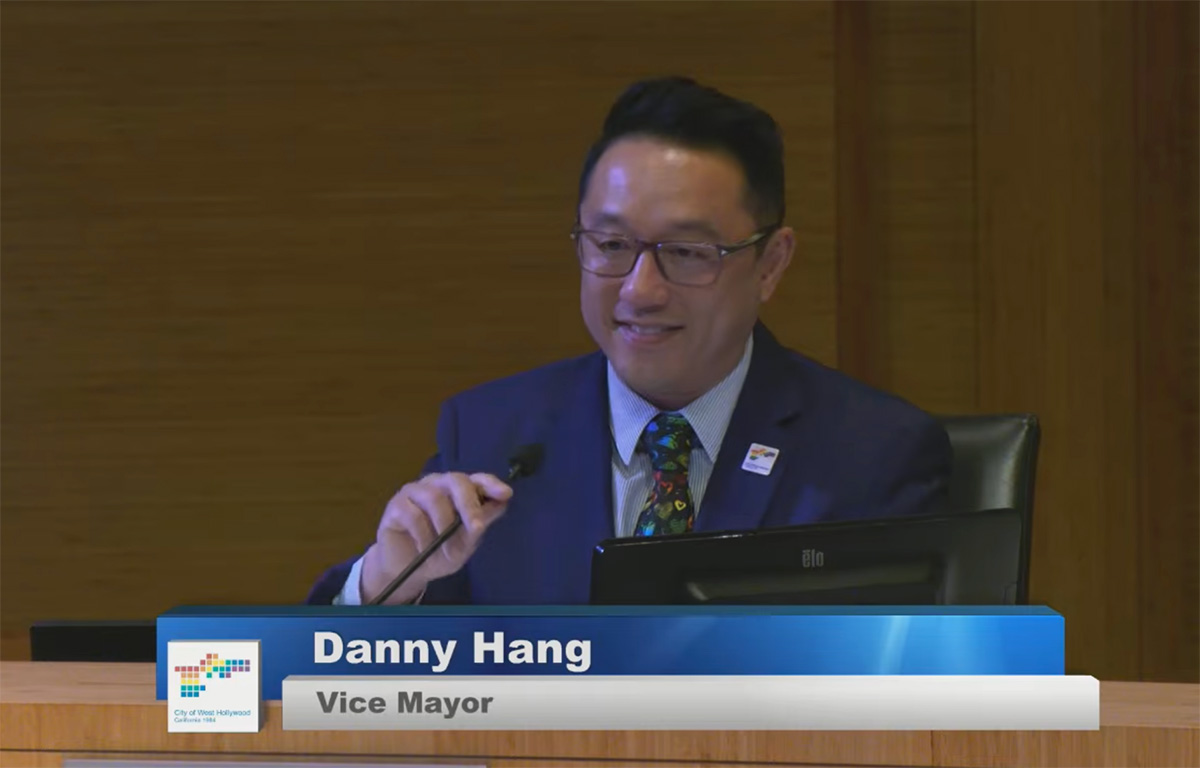
On Jan. 12, West Hollywood residents packed the City’s chambers at 6 p.m. to honor the work of outgoing mayor Chelsea Byers and witness councilmembers John Heilman and Danny Hang take their oath of office as they respectively assume their roles as Mayor and Vice Mayor for 2026.
In her last address as Mayor, Byers spoke about the optimism she holds onto in these unsteady times. To her, West Hollywood is a unique City: one that has become a model for what can be possible in an unjust society. “It’s us against the world. It’s West Hollywood on the stage,” Byers said. “It’s our story to tell, and every single person here contributes in such great ways to that.”
Byers was awarded a plaque on behalf of West Hollywood council members for her outspoken commitment to LGBTQ+ rights, economic justice, housing affordability, and policies that emphasize equity and inclusivity in West Hollywood.
Her leadership remains a bright, guiding light for Mayor Heilman, who was part of West Hollywood’s first city council after the independent city was incorporated in 1984. The spirit of that initial group remains today: queer, progressive, and led for and by the people. Yesterday’s ceremony marked the beginning of Heilman’s ninth time serving as Mayor, as well as his last year on the city council due to term limits.
Now, he leads side-by-side with a self-proclaimed “newcomer,” Danny Hang.
From the 626 to the Westside: Hang’s roots and journey
Hang was born in Monterey Park, a city in the San Gabriel Valley. The region is known for its diverse communities and AAPI-rich culture and history, and Hang recounted to the Blade the deep sense of belonging and comfort he felt growing up there. “I could go to a restaurant, speak Vietnamese or Chinese,” Hang said. “There are people who look like me out there. It is my home away from home.”
After college, he worked at the Social Security Administration, where he helped retirees, disabled people, and those impacted by loss file for Supplemental Security Income (SSI). The work was fulfilling, and he loved feeling that he had a tangible impact on others’ lives: that he could help residents grappling with difficult bureaucratic processes.
This passion grabbed the attention of L.A. County Supervisor Lindsey Horvath, who tapped Hang into serving on West Hollywood’s Disabilities Advisory Board in 2017. Hang eagerly accepted the role, having always been drawn to the vibrant, queer cultural hub. “WeHo was always the land of the unicorn: the land of magic,’ Hang told the Blade. “[This] was a town where I could be open, by myself, and find other people who were also LGBTQ+.”
After serving on the City’s Disabilities Advisory Board and, subsequently, the county’s Business License Commission, Hang noticed a lack of AAPI representation in local leadership. “There aren’t many AAPI people at all in West Hollywood. After I was on the commission, [I thought]: Hey, I think I want to run for city council,” Hang told the Blade.
Creating more inclusive leadership in WeHo
In 2024, Hang was elected to West Hollywood’s city council, becoming the first AAPI councilmember in the City’s 40 year legacy. “I want to see people who look like me in local government, because I want this community to be reflective of the modern-day people who live here. We’re a diverse community, and there’s no reason why we shouldn’t have people of color on the council, as well as more people of color appointed to our boards and commissions.”
Last night, local officials offered encouragement, support, and affirmation to Hang after he took his oath of office. “You’re already making history and certainly making waves across, not just your home region of the San Gabriel Valley, but certainly in California,” said Monterey Park councilmember Henry Lo.
Afterwards, Hang addressed the room, thanking residents, fellow council members and his family. “Standing here as the first AAPI elected to the West Hollywood City Council is deeply meaningful, and I couldn’t have done it without my parents. [They’re] right here in the front row,” Hang said. “My dad was a union worker, who showed me why standing up for workers matters. And my mom worked in a small business, owning a little nail salon in South Pasadena. She taught me what it means to care for others and to keep the community going.”
The year ahead: Heilman calls for residents to unite
Afterwards, Mayor Heilman spoke at length about the upcoming transitional year, the urgency of the current political climate, and ways that community members can step up to support each other. In his last term, he has set his eye on revitalizing the Sunset Strip, stabilizing rent and increasing housing affordability as well as examining the safety of the City’s foundational buildings, including the library and fire station.
He concluded his speech by making an unwavering stance on the “appalling” state of the federal government, stating that every West Hollywood resident must step up together in the face of ongoing federal attacks on the rights of LGBTQ+ people, specifically transgender people, as well as immigrants and other marginalized community members.
“This is a direct attack on our residents. It’s a direct attack on all of us,” Heilman said. “Now is not the time to hide. We need you…Ask what you can do to help people in the community,” he said, galvanizing residents to volunteer for the City’s various social services, nonprofits like Hollywood Food Coalition and Ascencia.
This call for unity and communal bravery echoes Byers’ belief in the courage of the people of West Hollywood. “41 years ago, a group of people defined what government could be,” Byers said. “We’re living the wildest dreams of people decades ago…and we get to be a bridge for that hope for the future. In such a critical moment, it’s truly our responsibility.”
Kristie Song is a California Local News Fellow placed with the Los Angeles Blade. The California Local News Fellowship is a state-funded initiative to support and strengthen local news reporting. Learn more about it at fellowships.journalism.berkeley.edu/cafellows.
Arts & Entertainment
2026 Most Eligible LGBTQ Singles nominations
We are looking for the most eligible LGBTQ singles in Los Angeles

Are you or a friend looking to find a little love in 2026? We are looking for the most eligible LGBTQ singles in Los Angeles. Nominate you or your friends until January 23rd using the form below or by clicking HERE.
Our most eligible singles will be announced online in February.
Los Angeles
AIDS Healthcare Foundation will celebrate its legacy of food relief at the New Year’s Rose Parade
This Thursday, AHF will march at the Rose Parade in celebration of its “Food for Health” program: an initiative that has fed community members in need for five years.

This Thursday, the AIDS Healthcare Foundation (AHF) will march in the highly-anticipated Rose Parade in Pasadena. AHF will present a Jack and the Beanstalk float with the titular character climbing amongst ginormous tomatoes, eggplants, strawberries, and tomato plants. It’s befitting of this year’s parade theme: “The Magic in Teamwork,” which celebrates the power of collective effort and unity.
The whimsical design also honors the organization’s “Food for Health” program, an initiative that began in 2021 to respond to food insecurity across the U.S. For nearly five years, “Food for Health” has hosted free food pantries and farmers’ markets, providing hot meals and fresh groceries nationally for families and veterans in need of food assistance.
“Food for Health” was also crucial in the wide-sweeping emergency response various nonprofits were trying to organize after the devastating Palisades and Eaton Fires in January. AHF’s program delivered over 75,000 hot meals to evacuees and Los Angeles Fire Department (LAFD) first responders.
The float also honors the individuals fueling these on-the-ground efforts, like Janet and Christy Lee, the sisters behind Altadena’s Fair Oaks Burger. For eight months after these major fires broke out, the Lee sisters worked closely with “Food for Health” to host free weekly farmers’ markets in the parking lot of their restaurant to support community members who had been displaced and impacted by the wildfires.
Both sisters will join fellow local advocates and leaders like labor activist Dolores Huerta, LAFD Captain Thomas ‘Kit’ Kitahata, Champions of Caring Connections executive director Bettye Randle, and “Food for Health” directors Carlos Marroquin and Tara O’Callaghan as riders on the AHF float.
The Rose Parade begins at 8 a.m. on Thursday morning, marching through 5 miles of Colorado Blvd. Now in its 137th year, the parade’s inaugural event was held in 1890 and continues to delight local residents and usher in the new year with illustrious musical performances and grand floats. More information about tickets and parade guidelines can be found on Pasadena’s Tournament of Roses website.
Kristie Song is a California Local News Fellow placed with the Los Angeles Blade. The California Local News Fellowship is a state-funded initiative to support and strengthen local news reporting. Learn more about it at fellowships.journalism.berkeley.edu/cafellows.
California
Hate crimes targeting transgender and gender nonconforming people have tripled since 2013
The Williams Institute is examining increasing anti-transgender and anti-gender nonconforming violence, as well as as the policies shaping it.
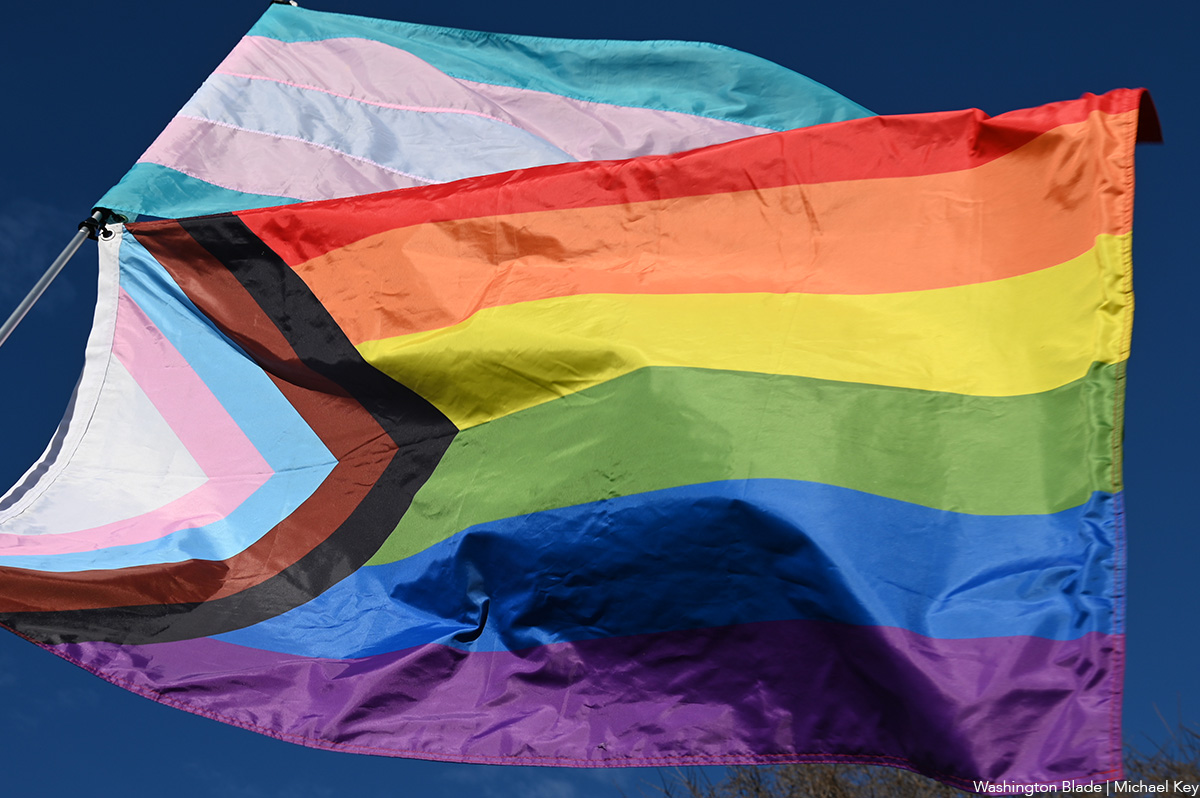
On Dec. 17th, the Williams Institute found that hate crimes targeting people based on their gender identity have more than tripled in California since 2013. The research center’s latest report on statewide gender identity hate crimes utilizes data reported to the California Department of Justice from 2001 to 2024, and outlines the increasing violence transgender and gender nonconforming people face.
Hate crimes motivated by gender identity and sexual orientation have made up 23% of all reported hate crimes in California since 2001, and nearly half of these incidents between 2013 and 2024 were reported in Los Angeles County alone. The study’s lead author, Jordan Grasso, points to several possible reasons for such high numbers in L.A., including the county’s overall population size, its large transgender community, and local law enforcement policies around identifying and reporting hate crimes.
It’s difficult to compare these numbers across counties, though, Grasso explained to the Blade, since practices like reporting, investigating, and recording incidents “are shaped at the local level and can vary widely from agency to agency.”
While these practices can vary, one overarching statewide shift occurred in 2013, when the California Department of Justice added “anti-gender nonconforming” as its own bias subcategory: one that was separate from “anti-transgender.” Since then, over 500 gender identity hate crimes targeting transgender and gender nonconforming people have been recorded in California.
This marked a step towards creating more nuance in the ways gender identity hate crimes are understood, reported, and responded to by law enforcement officials. Five years later, in 2018, California passed a law that required all law enforcement trainees to receive training on sexual orientation and gender identity.
“This matters because once someone reports a hate crime, officers who have a better understanding of these issues may be more likely to recognize the incident as a hate crime and record it as such, rather than treating it as a general offense,” Grasso wrote to the Blade.
As transgender and gender nonconforming people face increasing violence, they are also reporting lower levels of trust in police. They are more likely than cisgender people to experience discrimination, harassment, and bias when seeking help from law enforcement, which then discourages them from seeking help at all.
“There are clear gaps between transgender and nonbinary Californians’ experiences of violence and what shows up in official hate crime reports,” Grasso wrote. “These gaps are shaped in large part by longstanding and persistent negative interactions between LGBTQ people, especially transgender people, and law enforcement.”
Grasso found in another recent study that, while almost 60% of transgender and nonbinary survey respondents reported experiencing violence or harassment in the last year, their self-reported experiences may outnumber actual reported hate crimes. “This suggests that officially recognized hate crime reports capture only a small fraction of the violence and victimization that transgender and nonbinary people experience across the state,” they explained.
These gaps widen even more when considering transgender and gender nonconforming people who experience intersectional forms of hate. Transgender women, notably, face a disproportionate amount of violence and harassment, but current law enforcement recording policies around gender identity hate crimes can water these facts down.
Grasso explained that when law enforcement officers make hate crime reports, they are required to note a single “most serious bias,” a practice that aims to create one digestible explanation out of what are often very layered and complicated incidents of violence. “This has two consequences,” Grasso wrote. “First, gender identity hate crimes are likely undercounted, especially among people who are multiply marginalized. Second, patterns of victimization among people who are targeted for multiple, intersecting reasons—such as race and transgender identity—remain largely invisible.”
These limitations fuel new solutions, and several public policy recommendations are detailed in the report. Many of these suggestions urge improved data collection and access: namely, that law enforcement officials explain all applicable bias motivations in their hate crime reports to California’s Department of Justice. This way, researchers can better understand the scope and impact of those who are targeted by multiple biases.
The report’s authors are also supportive of the development of alternative options for reporting hate crimes because of the stigma and fear transgender and gender nonconforming people experience with law enforcement. Grasso points to CA vs. Hate, the California Civil Rights Department’s non-emergency resource and reporting hotline.
The local offshoot LA vs. Hate similarly provides a community-centered and non-law enforcement system that encourages Angelenos to report the hate crimes they experience and access various social services offered by grassroots organizations. This trust in community solutions also allows researchers to better comprehend and respond to increasing violence based on gender identity, as people are more willing to lean on these alternatives to share their stories.
Kristie Song is a California Local News Fellow placed with the Los Angeles Blade. The California Local News Fellowship is a state-funded initiative to support and strengthen local news reporting. Learn more about it at fellowships.journalism.berkeley.edu/cafellows.
Riverside County
Yesterday, Palm Desert residents shut down Councilmember’s “hateful” proposal to remove City’s Pride Month resolution
Mayor Pro Tem Joe Pradetto motioned to remove the Pride flag from City Hall, stating that the government “should not be in the business of celebrating one group’s private identity over another’s.”
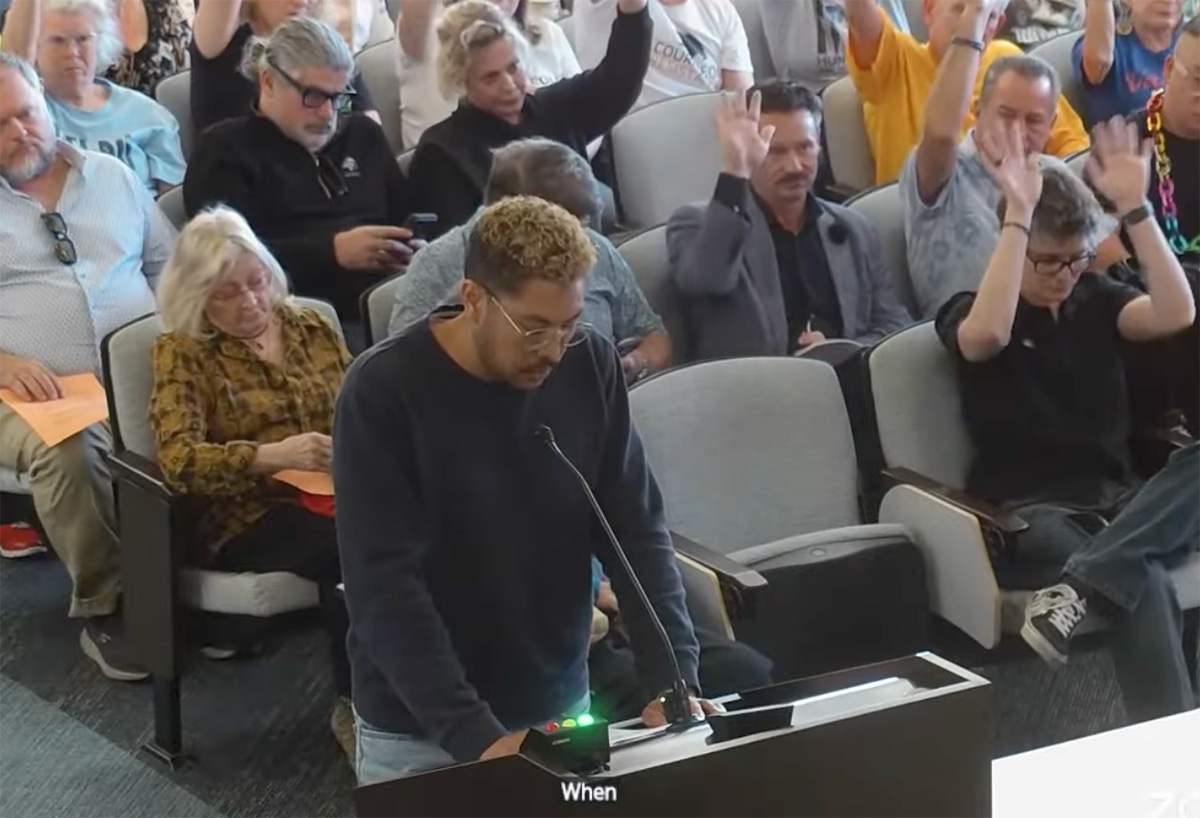
On Tuesday, Dec. 16th, a special city council meeting for Palm Desert, which rests in the Coachella Valley, opened up with a passionate public comment session that lasted for two hours. Resident after resident took to the podium, their voices tinged with outrage, to speak against recent moves made by Mayor Pro Tem Joe Pradetto to amend and rescind two City resolutions focused on diversity, inclusion, and LGBTQ+ pride.
These action items are outlined in a staff report that was prepared for yesterday’s special meeting. One included updating Resolution No. 2018-09, a formal statement that was adopted in 2018 to uphold the City’s commitment to nondiscriminatory policies. Pradetto motioned to edit a section of the resolution that initially focused on celebrating and learning from differences. He was in favor of changing this sentence to “the values that unite us” instead.
Pradetto also wanted to rescind Resolution No. 2024-038, which established for the City a policy related to LGBTQ+ Pride month commemorations last year. This includes the City’s issuing of a proclamation recognizing Pride Month and the displaying of a banner at City Hall in November, to coincide with local events like the neighboring Palm Springs Pride.
Pradetto claimed that the motivation for these motions came from “concerns…[about] unequal treatment” he received from community members about the Pride banner. After public comment concluded, Pradetto doubled down on his stance, stating that the government “should not be in the business of celebrating one group’s private identity over another’s.”
To this, queer residents like Bekz Lorton objected. “Actions like this proposal have given Palm Desert residents the power to treat us as less than human,” said Lorton, a programs manager at the LGBTQ Community Center of the Desert. “My existence is not a private identity, and I will not walk around in my hometown silenced, shunned or made invisible.”
Pradetto’s reframing of his motions to remove a resolution that promotes queer visibility as a step forward in inclusivity earned bitter laughs from the crowd. “Let the records show that today, Joe Pradetto took a stand for liberty, tolerance, and equality,” he stated, as attendants stared and guffawed in disbelief. Many argued that the sterile kind of “unity” he is trying to achieve is predicated on the alteration and removal of language and policies that explicitly protect the rights and visibility of marginalized community members.
“Recognizing one group does not prioritize a group over others, despite what you say,” resident Eugene Williams stated during public comment. “Recognition is not exclusion. Visibility is not favoritism. What that banner represented was safety, belonging and hope, especially for young people who are watching closely [as] to whether or not they matter in a place they call home.”
Towards the end of the meeting, Pradetto realized how outnumbered he was in his perspective and resolved that his motion would simply “die” without a seconding approval from the other councilmembers. To this, the crowd began to grow discontent. “Vote — don’t chicken out!” someone called out.
Councilmember Jan Harnik motioned to take no action on the resolutions, keeping their policies as they exist presently without any changes to how they are worded. The other councilmembers, including Gina Nestande, Karina Quintanilla, and Mayor Evan Trubee, voiced their unanimous support while Pradetto committed to his stance. He was the only “no” vote, and the motion passed to loud cheers and applause.
Resolutions No. 2018-09 and No. 2024-038 will remain as they are, in a victory bolstered by a great wave of community advocacy and support for queer identity. The win marks the continued importance of the Pride banner as a symbol for LGBTQ+ history, activism and resilience — one that will not be used to “score cheap political points by hurting others,” as stated by Palm Springs Pride in response to the situation.
Kristie Song is a California Local News Fellow placed with the Los Angeles Blade. The California Local News Fellowship is a state-funded initiative to support and strengthen local news reporting. Learn more about it at fellowships.journalism.berkeley.edu/cafellows.
Los Angeles
Recent L.A. County report reveals record number of hate crimes against transgender and nonbinary community members
The county’s Commission on Human Relations (LACCHR) released its annual hate crime analysis, revealing a rising violence against LGBTQ+ Angelinos.

Last Thursday, Los Angeles County’s Commission on Human Relations (LACCHR) released its 2024 Hate Crime Report, which analyzes data compiled from over 100 reporting groups, including local law enforcement agencies, educational institutions, and community-based organizations like the TransLatin@ Coalition. In its 45-year history of compiling these reports, the LACCHR recorded an “unprecedented” amount of hate crimes in this most recent analysis.
The report states that there were 102 anti-transgender crimes, “the largest number ever documented in this report.” 95% of these reported incidents were violent.
Part of the reason for this increase in reported crimes is the expanding outreach LACCHR is trying to create with partner organizations, ensuring that queer community members feel increasingly safe in reporting crimes that have been committed against them. These “grassroots efforts” have proven invaluable in building community trust, according to Dr. Monica Lomeli, who leads the production of LACCHR’s annual hate crime report.
“For the LGBTQ community, [there’s] a history of not being heard, not being believed or being misgendered,” Lomeli told the Blade. “I remember us working with a lot of different law enforcement agencies [and] victims would tell us: ‘They keep misgendering me. They don’t believe me. They keep having me make different reports.”
Lomeli stresses that, for those who feel unsafe reporting hate crimes to law enforcement agents, there are other options. One of these pathways is the commission’s community-centered initiative and reporting system, LA vs Hate, which allows people to report hate crimes and access resources like multilingual reporting guides. There is also 211 LA, a program funded by the commission that provides free, confidential support in 140 languages.
The report is instrumental to the formation of initiatives focused on queer safety and is also a resource to various LGBTQ+ organizations as they track violence committed against their community members. But the collection of this data has not been smooth, especially in this current administration.
Lomeli explained that, earlier this year, the now-defunct Department of Government Efficiency (DOGE) reached out to various human rights organizations, including the LACCHR, and was aiming to gain access to and shut down the commission’s hate crime database. “There was an attempt to bring down our data,” said Lomeli, who described these attempts as an infringement on the general public’s ability to access the report’s findings.
Moving forward, the commission’s Network Against Hate Crime, which hosts quarterly meetings with leaders from law enforcement agencies, advocacy groups, educational institutions, and social services providers, will hold a briefing on the report and discuss collaborative solutions to support community members.
Lomeli hopes to bring LGBTQ+ issues to the “forefront” of one of these upcoming meetings, given the high number of hate crimes committed against queer community members that were highlighted in the report. LA vs Hate will also continue to host campaigns, marketing efforts, and awareness events to promote the equitable treatment and safe existence of queer and other marginalized Angelinos.
Kristie Song is a California Local News Fellow placed with the Los Angeles Blade. The California Local News Fellowship is a state-funded initiative to support and strengthen local news reporting. Learn more about it at fellowships.journalism.berkeley.edu/cafellows.
California
Ricardo Lara, John Heilman inducted into Victory Institute’s Hall of Fame
Induction took place in D.C. on Saturday
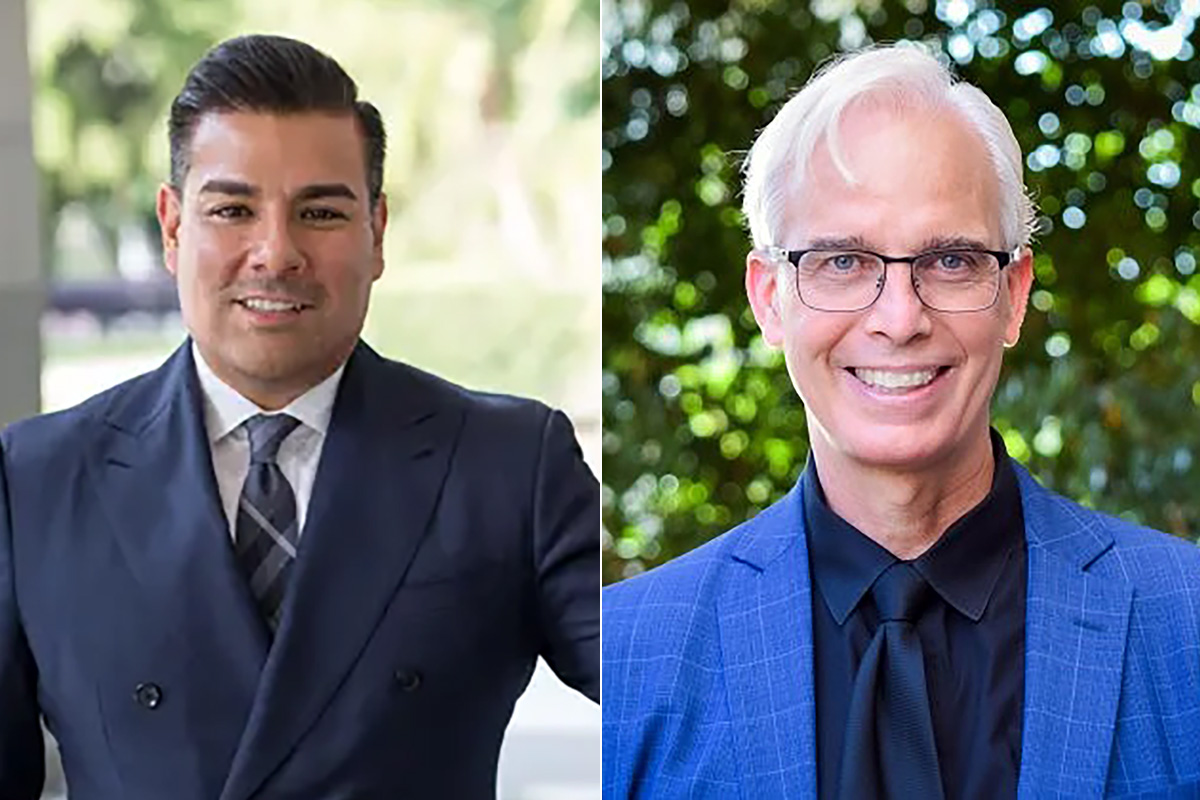
The LGBTQ+ Victory Institute on Saturday inducted California Insurance Commissioner Ricardo Lara and West Hollywood Vice Mayor John Heilman into its LGBTQ+ Political Hall of Fame.
The inductions took place during the Victory Institute’s annual International LGBTQ+ Leaders Conference in D.C.
U.S. Rep. Robert Garcia (D-Calif.), San Diego Mayor Todd Gloria, San Leandro Councilmember Victor Aguilar Jr., are among those who attended the conference. Evan Low, the LGBTQ+ Victory Institute’s president, served in the California State Assembly from 2014-2024.
Former state Senate President Pro Tempore Toni Atkins, former Assembly Speaker John Pérez, former state Sen. Christine Kehoe, former Palm Springs Mayor Ron Oden, Harvey Milk, a member of the San Francisco Board of Supervisors who was the state’s first openly gay elected official, and José Sarria, who ran for the San Francisco Board of Supervisors in 1961, have also been inducted.
-
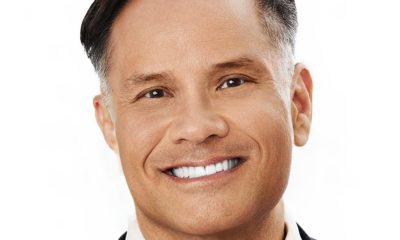
 Los Angeles4 days ago
Los Angeles4 days agoUCLA’s long-standing LGBTQ+ alumni organization welcomes new president
-

 a&e features1 day ago
a&e features1 day agoWriting her own story arc: Stuntwoman Ellie Haigh takes on Hollywood
-
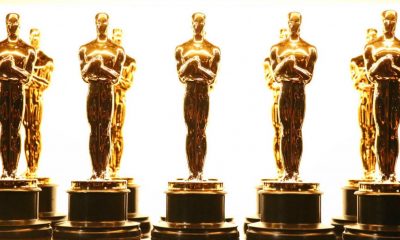
 Movies5 days ago
Movies5 days agoFew openly queer nominees land Oscar nominations as ‘Sinners’ and ‘One Battle After Another’ lead the pack
-

 LGBTQ+ Youth Mental Health4 days ago
LGBTQ+ Youth Mental Health4 days agoThe National Rainbow College Fund will grant $2,500 to 200 LGBTQ+ students: out or not
-

 Movies3 days ago
Movies3 days agoA ‘Battle’ we can’t avoid
-

 a&e features13 hours ago
a&e features13 hours agoEveryone should be a little more like Van Goth
-
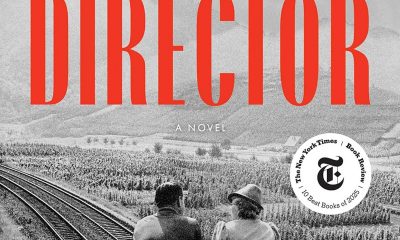
 Books10 hours ago
Books10 hours ago‘The Director’ highlights film director who collaborated with Hitler
-
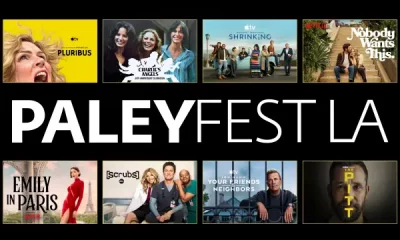
 Television5 hours ago
Television5 hours ago‘Pluribus,’ ‘The Pitt,’ and ‘Charlie’s Angels’ 50th anniversary among 2026 PaleyFest LA line-Up

